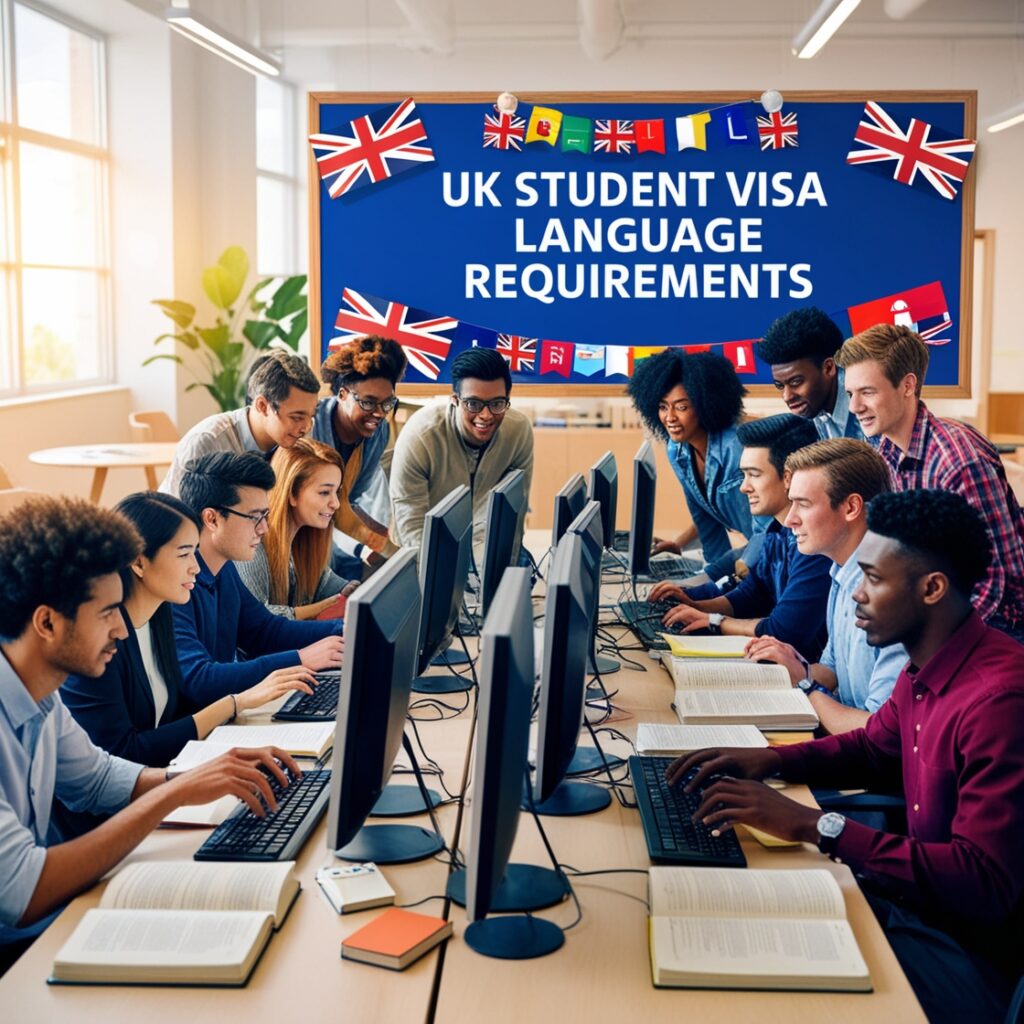Are you planning to study in the UK in 2025? One of the most crucial steps in securing your UK student visa is meeting the English language requirements. Understanding the UK student visa English language requirements is essential for any international student aiming to pursue higher education in the UK. In this ultimate guide, we’ll walk you through everything you need to know about these requirements, including the tests you need to take, the minimum scores needed, and tips to ensure you meet the language criteria. Whether you’re applying for a Tier 4 (General) student visa or another type of UK student visa, this guide will help you navigate the English language requirements with ease.
- 1. Why Are English Language Requirements Important for a UK Student Visa?
- 2. Who Needs to Meet the UK Student Visa English Language Requirements?
- 3. Approved English Language Tests for UK Student Visa
- 4. Minimum English Language Proficiency Scores for UK Student Visa
- 5. Steps to Prove Your English Proficiency
- 6. Exemptions from English Language Requirements
- 7. Common Mistakes to Avoid When Meeting English Language Requirements
- 8. Tips to Prepare for English Language Tests
- 9. Frequently Asked Questions (FAQs)
- 10. Conclusion
1. Why Are English Language Requirements Important for a UK Student Visa?
The UK student visa English language requirements are designed to ensure that international students have the necessary language skills to thrive in an English-speaking academic environment. Universities in the UK prioritize effective communication in classrooms, seminars, and assignments, making English proficiency essential for academic success. Without meeting these requirements, students may struggle to keep up with coursework or participate actively in discussions.
In addition to academic success, the UK student visa English language requirements are a vital component of immigration compliance. The UK government mandates these standards to ensure that students can integrate into the broader community and navigate daily life with ease. From attending lectures to handling everyday interactions, strong English skills help international students adapt quickly to their new surroundings.
Moreover, meeting the UK student visa English language requirements enhances your overall application credibility. Demonstrating English proficiency signals to both the university and immigration authorities that you are serious about your education and capable of contributing positively to the academic environment. It’s not just about passing a test; it’s about showcasing your readiness to excel in a global education hub.
2. Who Needs to Meet the UK Student Visa English Language Requirements?
Most international students applying for a UK student visa must meet the UK student visa English language requirements. This applies to applicants for undergraduate, postgraduate, and certain foundation courses. Whether you’re pursuing a degree in arts, science, or any other field, proving your English proficiency is a mandatory step in the visa application process.
However, not everyone is required to meet these standards. Applicants from countries where English is the official language may be exempt from the UK student visa English language requirements. For example, students from the United States, Canada, or Australia often don’t need to take additional language tests. It’s essential to check if your country qualifies for an exemption to avoid unnecessary testing.
Additionally, students who have completed a prior degree in English may also be exempt from the UK student visa English language requirements. For instance, if you have a bachelor’s degree from a recognized English-speaking university, you might not need to take a separate English test. Always review the specific requirements for your course and visa type to understand if exemptions apply to you.
3. Approved English Language Tests for UK Student Visa
To meet the UK student visa English language requirements, students must take an approved English language test. The most commonly accepted tests include IELTS (UKVI-approved), TOEFL iBT, and Pearson PTE Academic. These tests assess your reading, writing, listening, and speaking skills, ensuring you meet the academic and visa standards set by the UK government.
When selecting a test, it’s crucial to choose one approved by UK Visas and Immigration (UKVI). Not all English proficiency tests are recognized for visa purposes, so confirming the eligibility of your chosen test is a vital step. Meeting the UK student visa English language requirements involves achieving the minimum score specified for your academic level and institution.
It’s also worth noting that some universities accept additional tests, such as Cambridge English Qualifications or Duolingo English Test. However, for visa applications, it’s always best to stick to the tests explicitly listed in the UK student visa English language requirements. This ensures a smooth application process without the risk of rejection due to unrecognized qualifications.
4. Minimum English Language Proficiency Scores for UK Student Visa
The UK student visa English language requirements specify minimum proficiency scores that vary depending on the level of study. For instance, undergraduate students are typically required to achieve a minimum overall score of 5.5 to 6.0 on the IELTS, while postgraduate courses may demand a higher score, such as 6.5 or above. These benchmarks ensure students possess the necessary language skills to succeed academically.
It’s important to understand that different universities and programs may set their own English language proficiency standards, often higher than the minimum required by UKVI. While meeting the basic UK student visa English language requirements is essential for visa approval, you must also meet the specific requirements of your chosen institution. Researching and aligning your test preparation with these criteria is a key step in the process.
For pre-sessional courses or foundation programs, the language requirements are often more flexible, offering an opportunity for students with lower scores to improve their English skills before starting their degree. Understanding how your test scores align with both your academic goals and the UK student visa English language requirements can help you make informed decisions about which course to pursue.
5. Steps to Prove Your English Proficiency
Proving your English proficiency is a straightforward but essential part of meeting the UK student visa English language requirements. The first step is to register for an approved English language test, such as IELTS or TOEFL. Ensure you book the UKVI-approved version of the test, as this is mandatory for visa applications. Early registration is recommended due to high demand and limited test slots.
Once you’ve taken the test, you will receive a Test Report Form (TRF) or an equivalent certificate detailing your scores. It’s crucial to ensure your scores meet or exceed the UK student visa English language requirements for your chosen program and institution. This document will need to be submitted as part of your visa application, so keeping it safe and accessible is vital.
Some universities have their own procedures to verify English proficiency, such as interviews or internal assessments. However, for visa purposes, only UKVI-approved test results are accepted. By following these steps and staying informed about the UK student visa English language requirements, you can ensure your application process is smooth and successful.
6. Exemptions from English Language Requirements
Certain applicants are exempt from the UK student visa English language requirements, making the visa process more straightforward. For example, students from majority English-speaking countries, such as the USA, Canada, and Australia, are often not required to take an English proficiency test. These exemptions acknowledge the strong English skills typically demonstrated by citizens of these nations.
Additionally, if you have completed a degree-level qualification in English from a recognized institution, you may be exempt from proving additional language proficiency. Meeting this criterion can save you time and money during the visa application process. However, you must provide documentation, such as transcripts or certificates, to confirm your eligibility for this exemption under the UK student visa English language requirements.
It’s also worth noting that some scholarship programs and pathways might have unique provisions regarding English language exemptions. Carefully reviewing the guidelines for both your chosen course and visa type is essential to determine if you qualify for an exemption. This step ensures you meet the UK student visa English language requirements while avoiding unnecessary tests.
7. Common Mistakes to Avoid When Meeting English Language Requirements
Meeting the UK student visa English language requirements can be straightforward if you prepare thoroughly, but common mistakes often lead to delays or even visa refusals. One common error is failing to take a UKVI-approved test. While several English proficiency tests are available, not all are recognized for visa purposes. Ensure the test you choose is explicitly listed as acceptable by UK Visas and Immigration (UKVI).
Another frequent mistake is misunderstanding the required score. The UK student visa English language requirements specify minimum scores for different levels of study, but universities often have their own, higher benchmarks. Relying solely on the visa minimum can lead to rejection from your chosen institution. Always double-check the requirements for both your visa and academic program to avoid confusion.
Incomplete or incorrect documentation is another pitfall. When submitting proof of your English proficiency, make sure the test certificate is accurate, unexpired, and matches the details in your visa application. Even small errors, such as a mismatched name or missing document, can result in complications. By avoiding these mistakes, you can confidently meet the UK student visa English language requirements and streamline your application process.
8. Tips to Prepare for English Language Tests
Preparing for English language tests is key to meeting the UK student visa English language requirements. Start by understanding the format of the test you will take, such as IELTS or TOEFL. Familiarize yourself with the sections, including reading, writing, speaking, and listening. Many test providers offer official practice materials that can help you gain confidence and improve your skills.
Time management is crucial during test preparation. Set a study schedule that allows you to focus on each section of the test while also identifying your weaker areas. For example, if speaking is a challenge, consider practicing with a tutor or language partner. Consistent practice not only boosts your scores but ensures you comfortably meet the UK student visa English language requirements.
Lastly, consider enrolling in a preparatory course. Many institutions and online platforms offer courses specifically designed to help students achieve the required scores. These courses often include mock tests, feedback, and targeted strategies to improve your performance. With dedicated effort, you can meet the UK student visa English language requirements and increase your chances of securing admission to your dream program.
9. Frequently Asked Questions (FAQs)
Q: Can I use my high school English grades to meet the UK student visa English language requirements?
A: Typically, high school English grades are not sufficient to meet the UK student visa English language requirements. Most applicants must provide proof through a UKVI-approved English proficiency test, unless they qualify for specific exemptions, such as prior study in English at a higher education level.
Q: What happens if I don’t meet the required score?
A: If you don’t meet the minimum score specified in the UK student visa English language requirements, you may need to retake the test or enroll in a pre-sessional English course. Many universities offer these courses to help students improve their language skills before starting their degree programs.
Q: How long is the English proficiency test valid for a UK student visa?
A: Most English language test results, such as IELTS or TOEFL, are valid for two years. Ensure your test scores are still valid when submitting your visa application to meet the UK student visa English language requirements.
10. Conclusion
Meeting the UK student visa English language requirements is a vital step in your journey to studying in the UK. By understanding the approved tests, minimum scores, and preparation strategies, you can approach the process with confidence and avoid common pitfalls. Whether you’re applying for an undergraduate program or a postgraduate course, solid English proficiency is essential for academic and personal success in the UK.
Plan ahead and invest time in selecting the right test, practicing effectively, and submitting the necessary documentation. With the right preparation, you can meet the UK student visa English language requirements and focus on achieving your educational goals. Start your journey today, and take one step closer to studying in one of the world’s most prestigious academic destinations.



